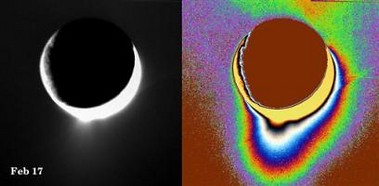Life’s Distant Outpost?
 "One of Saturn’s moons, Enceladus, is spewing out a giant plume of water vapor that is probably feeding one of the planet’s rings, scientists said on Thursday," Reuters reports, indicating the potential for biological life on the tiny moon.
"One of Saturn’s moons, Enceladus, is spewing out a giant plume of water vapor that is probably feeding one of the planet’s rings, scientists said on Thursday," Reuters reports, indicating the potential for biological life on the tiny moon.
NASA made the announcement yesterday, and it quickly became headline news around the world:
The findings, published in the journal Science, suggest that tiny Enceladus could have a liquid ocean under its icy surface which in theory could sustain primitive life, similar to Jupiter’s moon Europa. The plume was spotted by Cassini, a joint U.S.-European spacecraft that is visiting Saturn….
Several moons have been found to have evidence of liquid water and the chemical elements needed to make life, including Europa. But scientists are far more intrigued by the plume itself, a gigantic geyser of water vapor and tiny ice particles.
"It’s basically this giant plume of gas coming out of the south pole of Enceladus," Candy Hansen of NASA’S Jet Propulsion Laboratory in California said in a telephone interview.
"The plume is half the size of the moon. It’s huge," said Hansen, a planetary scientist. "Water is being spewed out of this moon. It solves some real mysteries that we have been struggling with over the years."
Indirect observations had shown the moon, discovered in 1789 by William Herschel, was rich in oxygen and hydrogen. But whether this was because of water was not clear.
Both water vapor and water particles were observed, as well as a smattering of other compounds such as methane and carbon dioxide, the international team of scientists report in a series of papers in Science.
It is possible the plume comes directly from ice, but more likely there is a liquid source, they said. It would have to be under the moon’s surface, which is covered with ice.
"If a wet domain exists at the bottom of Enceladus’ icy crust, like a miniature Europan ocean, Cassini may help to confirm it," Jeffrey Kargel of the University of Arizona at Tucson wrote in a commentary. "Might it be a habitat? Cassini cannot answer this question," Kargel added.
"Any life that existed could not be luxuriant and would have to deal with low temperatures, feeble metabolic energy, and perhaps a severe chemical environment. Nevertheless, we cannot discount the possibility that Enceladus might be life’s distant outpost."
Technorati Tags:
Science, Space, technology, Cool Stuff, PHYSICS, News, NASA, Planetary
